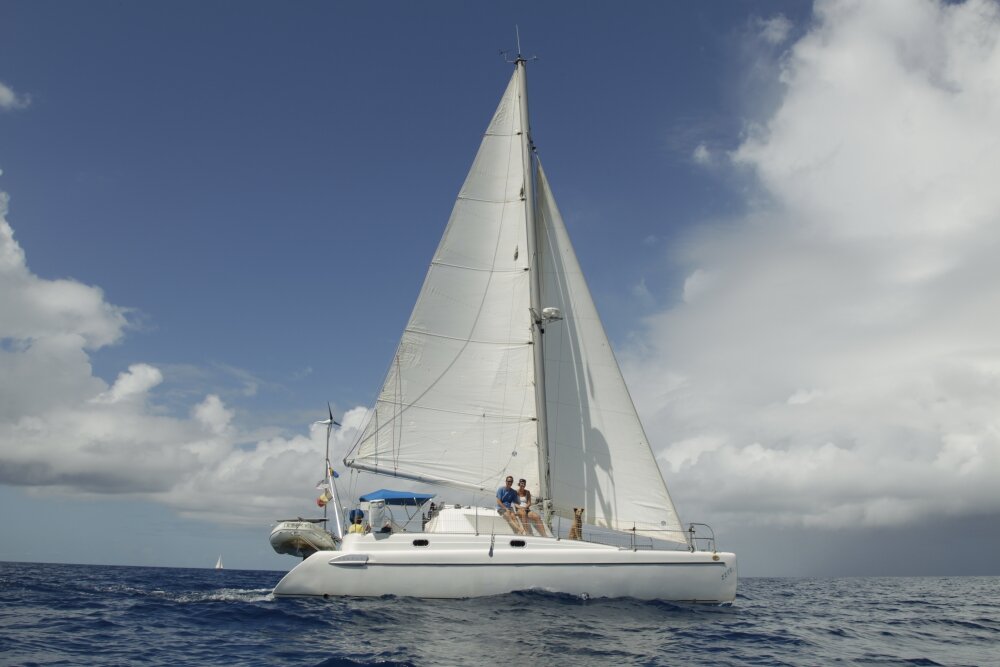CHRISTMAS DISASTER IN PUERTO RICO
a Story of loss and Heartbreak
Irie under sail in St. Martin.
By Liesbet Collaert
Christmas! Irie, our 35ft catamaran, is moored off Dewey on the island of Culebra, Puerto Rico. My husband, Mark, and I unwrap our modest gifts. Dogs Kali and Darwin watch curiously, before ripping theirs apart as we cheer them on. Our voices compete with the sizzling bacon fat on the stove.
We devour a festive breakfast. Darwin eats his food. Kali doesn’t touch hers. Mark pours the cooled bacon grease in her bowl. Nothing happens. Weird. Usually, when we give her this special treat, she gobbles it up.
“We need to bring her to a vet, right now,” I conclude.
“It’s Christmas Day. Where and how is that going to happen? Let’s take her first thing tomorrow.” Mark is the one with the brains.
We search in books and online for what could be wrong with Kali. We have no idea.
Mid-morning, we accept a neighbor’s invitation to share a Christmas meal around 2:30pm.
“We better head for the beach if we want to give the dogs time off the boat today,” Mark suggests.
Without further delay, we all pile into the inflatable and drive through the choppy bay, under the drawbridge, and into calm water on the west side of the island. From the moment we reach the beach, Kali embraces the shallow water. She strolls through it, wagging her tail, barking excitedly. She looks for rocks to paw.
Darwin and Kali anticipating bacon fat in Irie’s galley.
Darwin tries to play with his sister, but she shows no interest. Her age is catching up with her. Mark and I watch Kali while we sit on the sand.
Dogs that don’t eat are sick. Is something serious going on?
I brush the thought off. She’s so happy and such a special creature; more than just a dog. She adores people and leaves an impression on everyone she meets. We’ve both noticed how she has a harder time jumping in and out of the dinghy and climbing Irie’s back steps.
“I hope she doesn’t have cancer,” I say.
“My guess is it’s her heart. Hopefully, the vet figures out what’s wrong,” Mark replies.
After the Christmas party, we take our pups to shore one more time. Kali is a little slow. Before we go to bed, I pet our girl and let her know how much we love her. My heart is heavy. I don’t know why. I give her kisses on her nose. I hold her head. I sniff her ears. Sweet as honey. It’s her smell.
The next morning, Mark and I locate the house of a Humane Society member in Dewey. We explain our problem and learn that there’s no vet on Culebra. Marsha calls her vet in mainland Puerto Rico to confirm his clinic is open, arranges transportation for us in Fajardo, and finds a dog crate for the ferry ride.
“Are you coming with us?” Mark asks me, back on the boat.
“I probably should. It would make things easier, but somebody will not be happy.” I look at Darwin, who has never been without his mate.
At noon, we help Kali in the dinghy and take her to shore, a challenging feat with the high waves. Darwin stays on Irie, alone for the first time in his life.
From the moment we enter the transportation building, Kali must be put in the crate. Mark and I carry our caged 70-pound dog to and onto the passenger ferry. She’s not allowed in the air-conditioned section. Cargo goes outside, in the back, partly in the sun, on top of the roaring engines. We protest, to no avail. Mark and I keep our pup company during the hellish ferry ride. The noise is unbearable, the sun hot, the boat rolls back and forth. Kali is trapped.
As soon as the cage is off the ferry, we release our dog. A taxi is waiting and takes us to the animal clinic.
It’s quiet at the vet, the day after Christmas. Within minutes, the doctor calls us in to examine Kali. We talk about her symptoms. When the vet touches her stomach, he feels a big bump. Are we sure she barely ate this morning? This is not good. Mark’s eyes fill with tears. We hold Kali while the doctor draws blood and takes a scan. Afterwards, she stretches out on the cool floor and relaxes. We talk to her, pet her, and hug each other.
When the vet returns, he starts with the good news: the blood work seems fine, nothing out of the ordinary. The scan, however, shows two massive growths near her abdomen. The photos in his lab don’t lie. One tumor is the size of a baseball, the other as large as a football. With growths this size, the chance of the cancer being spread is high. Kali is not in pain, but the masses keep her from eating because they’re pushing against her belly. More tears well up.
“What do you recommend?” Mark asks.
“I can’t recommend anything,” the doctor says. “I can only give you options.”
We stare at him, unable to grasp the situation. We can take Kali home and feed her wet and liquid food until she becomes too weak and needs to be put to sleep. Or the vet can perform exploratory surgery and remove the tumors if not spread out. If the cancer is too bad, he can either sew her back up or euthanize her right there and then.
Kali’s tail sways back and forth, slapping on the ground, when we return from the lab. Three times. It always makes me happy: thump, thump, thump. It’s one of her few expressions. We sit back down with our baby. The tears flow.
Ten and a half years is too young for her to die. She needs more time to play in the water, eat steak on her birthdays, and surround herself with balls. Mark and I talk through the options and understand she’s extremely sick.
How could we not have noticed before?
“Let’s go ahead with the exploratory surgery,” Mark tells the vet. We need to know what’s going on and this is the only way to heal her. If the cancer is too far progressed, we will take Kali home and give her everything she desires for her last days or weeks. While the vet prepares for surgery, we spend more time with our sweet girl.
Does she have any idea what’s going on?
We cherish her, pet her, communicate with her, using sentiments only she recognizes. I smell her ears, make her do one more trick, absorb her intent look. Mark gives her a butt rub.
“Be strong, baby. You survived Parvo. You can do this,” he whispers, his voice breaking.
We ask her to get up on her leash. She walks to the door, the one to the exit. She wants to go home. Enough of this, she seems to think. We have to pull her away and send her through the other door, the one to the operating room. She keeps looking back, her gaze asking “What’s going on? What are you doing to me?”
During Kali’s surgery, Mark and I walk around the block and talk. Taking her back to Irie if the cancer metastasized doesn’t sound like a possibility anymore. For the first time on this sailing adventure, we wish we lived in a house. We push away the thought of leaving her behind. This can’t happen to our girl.
We sit in the waiting room when the assistant calls us in. The vet stands in the examination room with bloody hands.
“When I opened her up, it looked promising. Her spleen is full of cancer, but I can remove that. Dogs can live without a spleen. I was hopeful. Then I checked further. Her liver is completely covered with masses. My guess is that the cancer has entered her lungs as well.”
Another shock. More tears. More disbelief. Nothing can be done. He gives us a few minutes in private. Mark and I hug each other. There’s only one option left. We have to let her go.
Kali is stretched out sideways on the table, a towel over her body, an IV in her leg. Her eyes are open, her limp tongue clipped out of her mouth.
This must be a dream. A nightmare. We stand next to her cute face, touch her, talk to her. She can’t hear or feel anything. She’s already somewhere else. The vet gives her the fatal injection. Words cannot describe how we feel.
For the last four years, the four of us have been together 24/7. She’s a family member. We can’t lose her! The machine monitoring her heart rate stops beeping. Our baby is gone. She is no more. She just lies there. Motionless. Dead.
Our world collapses.
The doctor leaves. Mark can’t stay in the room any longer.
It’s just me and Kali, my sweet girl. Poor baby. I pet her soft head. It’s wet from our tears. I kiss her nose, smell her ears one last time, tell her we’re so sorry. I can’t stop crying. I allow my whole body to shake and mourn for minutes. Reluctantly, I leave the room.
Looking at our peaceful dog through the doorway, Mark and I ask questions and obtain as much information as possible. The vet tells us we made the right decision. “Now I can say this,” he adds. Kali was in bad shape. Cancer symptoms in dogs show up when it’s often too late to do anything about it. She wouldn’t have lived longer than a few days.
It was 3pm when we arrived at the vet to figure out what was wrong with Kali. At 5pm, she’s gone and we leave without her. The cab picks us up. We put the empty crate in the trunk.
“El perro?” The driver asks about our dog.
“Muerto.” Dead, I answer in a daze. My eyes run again.
The evening ferry ride back to Culebra is a trip from hell. The Christmas winds blow like crazy. It’s pitch-black outside as we head into the waves and get thrown back and forth. Kali wouldn’t have liked this at all. I’m cold and seasick.
Back on our boat, Darwin greets us profusely. His tail almost falls off. He looks around. Something is missing. Mark and I feel terrible. He didn’t even get to say goodbye to his companion. Neither did we, really. We sit down with our boy. It’s quiet on Irie. No more Kali. No more triple-thumping on the floor. No more intent puppy eyes. No more high-pitched barking from shallow waters. No more digging up rocks.
Kali’s blanket remains empty.
FROM WOMEN WHO SAIL NEWSLETTER | ISSUE 5. | DECEMBER 2020.
TO RECEIVE MORE ARTICLES LIKE THIS, SUBSCRIBE TO OUR NEWSLETTER.
Liesbet collaert
Liesbet is a bilingual freelance writer, translator, editor, and photographer from Belgium who has been writing and traveling her entire life. Her work is published internationally in anthologies and magazines, including Cruising World, Blue Water Sailing, Ocean Navigator, Eldridge Tide and Pilot Book, Islands, Yachting World, Sailing Today, All At Sea, Caribbean Compass, and Zeilen. She also created walking tours for Marigot and Philipsburg in St. Martin.
The author has been interviewed about her alternative lifestyle by Multihull Sailor, Modern Day Nomads, Ocean Navigator, The Wayward Home, The Professional Hobo, and Grey Globetrotters among others. She contributed to extensive cruising surveys for All At Sea and Caribbean Compass and became an assistant-editor for Caribbean Compass in January 2019.
Liesbet loves animals, nature, and the promise of adventure. A nomad since 2003, she calls herself a world citizen and currently lives “on the road” in North America with her husband and rescue dog. Find her stories and photos at itsirie.com and roamingabout.com. Plunge is her first book.



